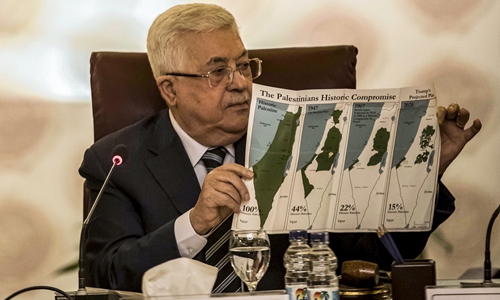Abbas cuts all remaining ties with Israel, US
The Palestinian Authority has cut all ties with the US and Israel, including those relating to security, after rejecting a Middle East peace plan presented by US President Donald Trump, Palestinian President Mahmoud Abbas said Saturday.
Abbas was in Cairo to address the Arab League, which backed the Palestinians in their opposition to Trump’s plan.
The blueprint, endorsed by Israeli Prime Minister Benjamin Netanyahu, calls for the creation of a demilitarized Palestinian state that excludes Jewish settlements built in occupied territory and is under near-total Israeli security control.
“We’ve informed the Israeli side … that there will be no relations at all with them and the United States including security ties,” Abbas told the one-day emergency meeting, called to discuss Trump’s plan.
Israeli officials had no immediate comment on his remarks.
Israel and the Palestinian Authority’s security forces have long cooperated in policing areas of the occupied West Bank that are under Palestinian control. The Palestinian Authority also has intelligence cooperation agreements with the CIA, which continued even after the Palestinians began boycotting the Trump administration’s peace efforts in 2017.
Abbas also said he had refused to discuss the plan by with Trump by phone, or to receive even a copy of it to study it. “Trump asked that I speak to him by phone but I said ‘no,’ and that he wants to send me a letter … but I refused it,” Abbas said.
Abbas said he did not want Trump to be able to say that he, Abbas, had been consulted.
He reiterated his “complete” rejection of the Trump plan, presented on Tuesday. “I will not have it recorded in my history that I sold Jerusalem,” he said.
The blueprint also proposes US recognition of Israeli settlements on occupied West Bank land and of Jerusalem as Israel’s indivisible capital.
The Arab League foreign ministers meeting in Cairo said the plan did not meet the minimum aspirations of Palestinians, and that the League would not cooperate with the US in implementing it.
The ministers affirmed Palestinian rights to create a future state based on the land captured and occupied by Israel in the 1967 Middle East war, with East Jerusalem as capital, the final communique said.
Foreign ministers from Egypt, Saudi Arabia, Jordan, three close US allies, as well as Iraq, Lebanon and others said there could be no peace without recognising Palestinian rights to establish a state within the pre-1967 territories.
After Trump unveiled his plan, some Arab powers had appeared, despite historic support for the Palestinians, to prioritize close ties with the US and a shared hostility towards Iran over traditional Arab alliances.
Three Gulf Arab states – Oman, Bahrain and the United Arab Emirates – attended the White House gathering where Trump announced his plan alongside Netanyahu.
Palestinian President Mahmoud Abbas holds a placard showing maps of (from left to right) historical Palestine, the 1947 United Nations partition plan on Palestine, the 1948-67 borders between the Palestinian territories and Israel, and a current map of the Palestinian territories without Israeli-annexed areas and settlements, as he attends an Arab League emergency meeting discussing the US-brokered proposal for a settlement of the Middle East conflict at the league’s headquarters in the Egyptian capital Cairo on Saturday. Photo: AFP


